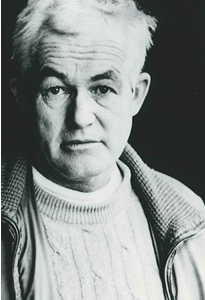De Engelse schrijver en journalist Colin MacInnes werd geboren op 20 augustus 1914 in Londen als zoon van zanger James Campbell McInnes en schrijfster Angela Thirkell, die de kleindochter was van de Prerafaëlieten kunstenaar Edward Burne-Jones en ook gerelateerd aan Rudyard Kipling en Stanley Baldwin. Zijn familie verhuisde naar Australië in 1920, maar MacInness keerde in de jaren 1930 terug. Gedurende een groot deel van zijn jeugd stond hij bekend als Colin Thirkell en gebruikte hij deze achternaam van de tweede echtgenoot van zijn moeder; later gebruikte hij de naam van zijn vader McInnes, achteraf veranderd in MacInnes. MacInnes werkte in Brussel van 1930 tot 1935, daarna studeerde hij schilderkunst in Londen aan de Polytechnische school en de School voor Tekenen en Schilderen aan Euston Road. Tijdens WO II was hij actief voor de Britse inlichtingendienst en hij werkte na de Europese wapenstilstand in bezet Duitsland. Dit resulteerde in zijn eerste roman. “To the Victors the Spoils”. Kort na zijn terugkeer in Engeland, werkte hij voor BBC Radio totdat hij met schrijven zijn geld kon verdienen. In de jaren 1950 schreef hij een aantal boeken over de Londense jeugd en de cultuur van zwarte immigranten, zoals “City of Spades” (1957), “Absolute Beginners” (1959) en “Mr Love & Justice” (1960) Veel van zijn boeken speken in de omgeving van Notting Hill in Londen, toen een arme en raciaal gemengde wijk, waar veel nieuwe immigranten woonden. MacInnes was openlijk biseksueel.
Uit: Absolute Beginners
“So I went out of the Dubious to catch the summer evening breeze. The night was glorious, out there. The air was sweet as a cool bath, the stars were peeping noisily beyond the their neons, and the citizens of the Queendom, in their jeans and separates, were floating down the Shaftesbury avenue canals, like gondolas. Everyone had loot to spend, everyone a bath with verbena salts behind them, and nobody had broken hearts, because they all were all ripe for the easy summer evening. The rubber-plants in the espressos had been dusted, and the smooth white lights of the new-style Chinese restaurants – not the old Mah Jongg categories, but the latest thing with broad glass fronts, and dacron curtainings, and a beige carpet over the interiors – were shining a dazzle, like some monster telly screens. Even those horrible old anglo-saxon public-houses – all potato crisps and flat, stale ale, and puddles on the counter bar, and spittle – looked quite alluring, provided you didn’t push those two-ton doors that pinch your arse, and wander in. In fact, the capital was a night-horse dream. And I thought, ‘My lord, one thing is certain, and that’s that they’ll make musical sone day about the glamour-studded 1950s’. And I thought, my heaven, one thing is certain too, I’m miserable.”
(…)
“And that’s what jazz music gives you: a big lift up of the spirits, and a Turkish bath with massage for all your nerves. I know even nice cats (like my Dad, for example) think that jazz is just noise and rock and sound angled at your genitals, not your intelligence, but I want you to believe that isn’t so at all, because it really makes you feel good in a very simple, but very basic, sort of way. I can best explain it by saying it just makes you feel happy. When I’ve been tired and miserable, which has been quite more than often, I’ve never known some good pure jazz music fail to help me on.”

Colin MacInnes (20 augustus 1914 – 22 april 1976)
